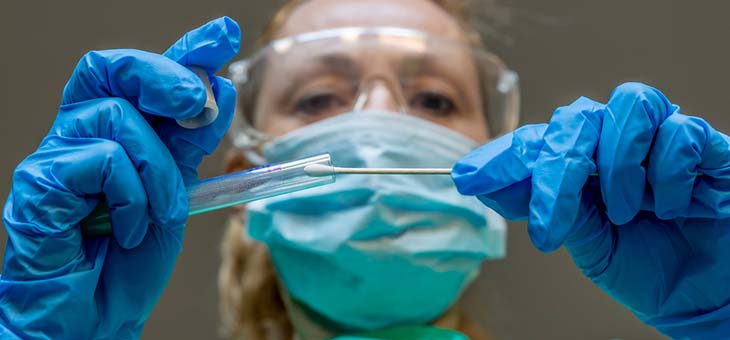A group of international researchers say they have found a second strain of the coronavirus that is “more contagious”.
The research is yet to be peer reviewed and has divided the scientific community – some say it is impressive, others caution that the conclusions are yet to be proven and need to be treated with caution. However, the research has been posted online by the scientists from the US and UK to aid vaccine development.
The researchers concluded that the newer strain, the G-strain of SARS-CoV-2, was spreading faster and feared it would hamper efforts to create a vaccine. They said it appeared to have first emerged in either Europe or China in January, then spread to most US states and to Australia.
It quickly became the dominant variant in each region, they said, suggesting it may be more transmissible than the original D-strain, the ABC has reported.
Australia’s deputy chief medical officer Paul Kelly said newer strains were not unexpected.
He told the ABC: “Whether they are more transmissible or not, that is a typical thing that happens to this type of virus that is spread from animals to become transmissible between humans.
“It does become generally more transmissible over time and less severe over time.”
Paper author Professor David Montefiori said the results showed researchers needed to be alert to mutations.
“I would say [coronavirus] is acquiring mutations that provide a fitness advantage sooner than we expected,” said Prof. Montefiori, who is also a director of the Laboratory for AIDS Vaccine Research at Duke University medical centre in North Carolina.
He said further work to test the theories with cultures was underway, but that for this strain to spread “so rapidly and extensively”, it must be better at infecting people.
Professor Lisa Sedger, head of the viruses and cytokines research group at University of Technology Sydney, told the ABC the data in the paper was “impressive”.
“Data of this quality are not often available for human viruses,” said Prof. Sedger, adding that the information in the paper could “inform the type of vaccine that is most likely to work” and the approaches to avoid.
But University of Sydney viral evolution expert Professor Edward Holmes said he had reservations about the importance of the research.
“Will it impact anything important about how we respond to the virus? That’s unclear,” he said. “At the moment, I’m sceptical.”
Medical specialists explain that after an infection, the immune system can disrupt and prevent a second infection. But a new strain can undermine that immune response.
Prof. Montefiori said: “Our main concern is how it [the new strain] might impact the effectiveness of current vaccines.
“Will the vaccines be less effective against the new form and need to be modified to be equally effective against both forms?”
The researchers found preliminary evidence that people with the newer strain had higher “viral loads”, that is, there was more of the virus in their body, which they say would help explain why the new strain spread faster.
Professor Bill Hanage, from Harvard, said: “Right now, there are better ways of fighting the pandemic than worrying about different strains …”
Others say that studying the two strains in the lab is important. Barbara Brito Rodriguez, a viral geneticist from the University of Technology Sydney, said: “The only way to know how sequence data translates to virulence, and to transmission etc, is by actual laboratory experiments.”
The study was posted to BioRxiv, a site researchers use to rapidly share findings.
Read the full ABC article here.
Do you fear that a COVID-19 vaccine is a long way off? How will that affect you day-to-day life?
If you enjoy our content, don’t keep it to yourself. Share our free eNews with your friends and encourage them to sign up.
Related articles:
Warning in eye checks
How green can lift your mood
Boost your memory with this spice

